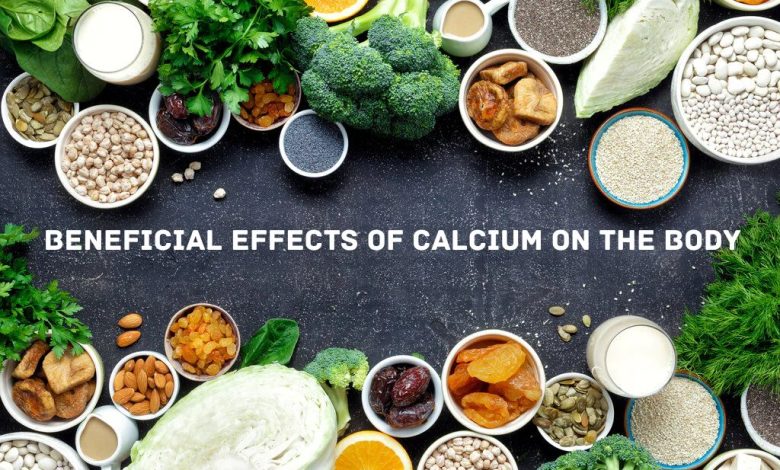Beneficial Effects Of Calcium On The Body

Calcium is the most abundant mineral found in the body. 99% of its calcium is stored in bones and teeth. Calcium supports the structure and function of bones and teeth. It is found in dairy products, green leafy veggies, cereals, fortified foods, and supplements.
Natural food sources are the best way to get the calcium that you need. Supplements may have benefits that reduce the risk of developing bone and heart disease, as well as other health problems.
This article discusses how calcium supplements can help protect your health. This article provides information and research about It supplements to help you decide if they are right for your needs.
Health Benefits
It plays an important role in many of the functions of your body. These include calcium’s ability:
- Support bone and tooth formation
- Maintain your body’s strength
- Assist with the movement of muscles
- Assist in the transmission of nerve messages between brain and body
- As vessels relax and contract, blood flow is increased.
- Enzymes and hormones are released to support body functions
Osteoporosis and Bone Density
It is essential for bone building and to prevent or delay the loss of bone later in life. This is particularly important for women who are at high risk of bone loss after menopause or the elderly.
Research has shown that calcium supplements can protect against certain fractures in some cases. Others do not. These results can vary depending on the age of the people being studied and how consistently they use It supplements.
Recap
While calcium plays an important role in maintaining your health, bone health is the most important. Calcium intake at a young age can help prevent bone loss later in life.
Colon Cancer
Many data points to the possibility that calcium may be beneficial in preventing colon cancer. These results are not conclusive.
For example, one review looked at the impact of calcium supplements on colon cancer development. This review focused on adenomatous Polyps, which may be precursors of cancer.
One Harvard study examined calcium intakes up to 1,250 mg (mg) daily. Higher doses of calcium were associated with a 35% decrease in certain colon cancers. This could be due to the fact that the amount of calcium and the number of people who take Vidalista 60 or Cenforce 100 are both factors in determining the degree of protection that calcium provides for colon health.
However, there are many other factors that can increase the risk of colon carcinoma. These include:
- Genetics
- Weight
- Diet
- Smoking
Weight Control
Research results on calcium’s role in weight control are mixed. Studies have found a correlation between calcium intake and lower body fat. Other studies have shown that consuming low-fat calcium foods while limiting your total calories, can reduce your chance of becoming obese. It could also lead to weight loss in obese individuals.
Calcium supplements, as opposed to calcium in your diet, did not appear to offer the same benefits.
The most important thing to do if you want to lose weight is to ensure that you are using fewer calories than you take in. Healthy fats and a balanced diet should be your goal.
Preeclampsia
Preeclampsia can occur in pregnant women. These are the symptoms:
- High blood pressure
- The swelling of the feet and hands
- Urine contains protein
Research has examined the benefits of calcium supplements in preventing preeclampsia. A review of 13 clinical trials showed that 1,000mg of calcium per day, starting at approximately 20 weeks gestation, had a significant effect on the risk of preeclampsia and high blood pressure.
View More Product:
Vidalista 80 | Cenforce 200 | Fildena 150
High blood pressure
There is no consensus on whether calcium lowers blood pressure or increases the risk of developing high blood pressure. While some clinical trials found a link between calcium intake and hypertension, others found no relationship. Although small changes in systolic blood pressure have been observed, the exact nature of the effect could depend on the population being studied.
Heart Disease
Research on calcium and heart disease is complex. It seems that there is no direct relationship between calcium intake from your diet and your blood vessels (a sign of early-stage heart disease). However, some studies have shown a link between calcium supplements and heart disease (CVD).
One theory suggests that calcium supplements may have a stronger effect on blood calcium levels. This causes calcification to increase, which is a sign of CVD. Increases in blood coagulation can lead to clotting and other conditions that increase your risk of developing CVD.
Researchers discovered that calcium supplements with or without vitamin A moderately raise the risk of having a heart attack. Based on the variables in the study, however, you will see mixed results.
Skeptics claim that evidence linking calcium supplements to CVD risk is inconsistent, while others argue that safe doses for healthy people are normal-range.
Possible side effects
The Tolerable Upper Level (UL) is the maximum amount that a person should consume.
Adults between the ages of 19 and 50 should consume 2,500 mg daily
Children aged 9-18 years receive 3,000 mg daily
For older adults over 51, 2,000 mg daily
Constipation and bloating can cause by an excess intake of more than the UL amount
Research suggests that high doses of 4,000 mg are associated with numerous health risks.
Supplements can still cause side effects for some people, even if they are within the recommended limits. These side effects can include constipation, gas, bloating, or a combination thereof. It may vary depending on the type of supplement.
Spreading calcium doses throughout the day is one way to reduce symptoms. You can also eat your meals.
Supplements that contain too much calcium can lead to high blood calcium levels. This is known as hypercalcemia. Hypercalcemia can lead to kidney stones and other damage to the kidneys. It can also lead to the milk-alkali syndrome.
Drug Interactions
Before you start taking supplements if you’re taking medication, make sure to talk with your healthcare provider. They may interact with other drugs. Some drugs can also interfere with the way the body absorbs them.
Recap
Calcium supplements could help lower the risk of certain diseases such as colon cancer and high blood pressure. These benefits are not supported by any evidence. There are also risks associated with taking too much. One of these is the possibility that you might take too much and cause side effects.
Dosage and preparation
Your age will determine how much calcium you need each day. These are the U.S. These are the Recommended Dietary Allowances (RDA) amounts in mg for calcium
1,000 for adult males (19 to 70 years) and females (19 to 50 years).
1,200 for seniors (men and women over 70 years old)
1,300 for children (age 9-18)
1,300 for adolescents aged 17-19 who are pregnant or breastfeeding
1,000 for breastfeeding and pregnant adults over 19 years old
It is best to not exceed 500mg in one dose
If you take 1,000 mg of calcium daily, for example, you can divide the dose (500 mg in the morning, 500 mg at night).
Supplements and rich diets can help you achieve these levels. These ranges may not be the same as the maximum UL mentioned above.
Different calcium types may contain different amounts of calcium. Make sure that the label for the calcium product you purchase lists both the total and the “elemental calcium”. You may need to look for another supplement if you don’t see them.
Carbonate (calcite), and Citracal are the main types of supplements
Calcium carbonate is often more readily available. Calcium carbonate must take with food as it requires stomach acids to absorb.
It is best to take it with food, as you may need to take it more often than once daily. It can find in many over-the-counter anti-inflammatory products such as Tums. Each chewable tablet contains 200-400 mg of elemental calcium.
It iscitrate can also take with or without food. It is a good supplement for those with achlorhydria, which is a low stomach acid level. People with inflammatory bowel diseases or other absorption disorders may also benefit from calcium citrate. A form of it is often find in fortified fruit juices.
Absorption is important for vitamin D and magnesium. To optimize your intake, you may look for a supplement that contains one or both of these nutrients.
Sources of dietary nutrition
Two to three dairy servings a day is a good goal for optimum intake. These include dairy products such as yogurt, cheese, and milk.
You can eat foods that are high in It if you don’t eat dairy. These include yogurt alternatives, nut milk, orange juices, cereals, and tofu.
It is find in salmon and other fatty fish. You can also get It from cabbage, kale, and other leafy green veggies, but they take a while to be absorbe by the body.
Recap
Foods rich in this mineral are the best. Consider the recommended dosage if you are considering taking supplements. If you need more information, consult your healthcare provider. Make sure you only purchase products from trusted sources that clearly state the amount of elemental in each product.
Summary
Research on the health benefits of supplements is still mixe. For example, calcium is well-known to promote bone health and help prevent osteoporosis in women who have gone through menopause.
It is not clear if supplements have any benefits for supporting heart health and preventing colon cancer. Supplements can also pose risks due to possible interactions with other drugs.
You should ensure that you only purchase high-quality supplements and follow the recommended dosage ranges. You can check the label to see how many “elementals” are list so you know exactly how much your body can use.
Although calcium supplements can offer some health benefits, the best source of calcium is always food sources. Before you start any supplements, talk to your healthcare provider.




